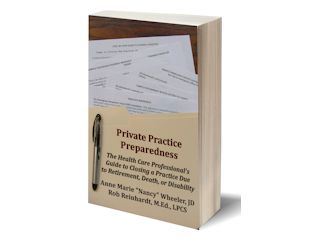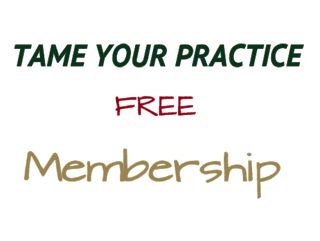More Than Just a Free Newsletter
Become a Tame Your Practice member for FREE and receive our newsletter, special offers, and exclusive members-only content.
Is Your Practice Prepared For Any Contingency? A Professional Will Is Not Enough
Denial is a powerful defense mechanism and despite all of our knowledge and training, many (most?) mental health clinicians stick their heads in the sand about the potential for disaster to strike them. Despite the fact that our ethics codes call for it and HIPAA/HITECH requires it in the case of electronic data, most mental health clinicians I speak with do not have an emergency transition plan in place.
Normally one of the most empathetic bunch of humans on the planet, many of us neglect to consider what will happen to our clients, our colleagues, and even our loved ones in connection with an unexpected closing of our private practice due to death, disability, natural disaster, or some other emergency. In the midst of their mourning, the last thing they need is to be required to put together the puzzle of how our practices run in order to transfer the care of clients and properly close the practice. To be clear, such a plan is not only a necessity in cases of such magnitude. I know of therapists who have been drawn away from their work for extended periods, or even for good, due to the illness of a family member, or even a simple re-evaluation of their chosen career path.
Important Components of a Contingency Plan
In any of these situations, having a clearly documented plan for transition and potential closing of a practice is not only the ethically responsible thing to do, but also will save everyone involved additional pain and suffering. There has been a lot of emphasis in recent years on creation of a professional will, a document that clarifies who has responsibility for client records and finances, should a therapist die. While a professional will is a great start, it is not enough.
A “professional will” most likely will:
- Only be activated in case of the death, or potential disability, of the therapist.
- Not include all of the information a records custodian or other responsible party needs in order to ensure transition of client care to appropriate providers, take over financial responsibility for the practice, and if appropriate, close the practice down properly.
Other documents and information important to a smooth transition include:
- Practice Closing Notification Letters
- Records Custodian Agreement
- Document(s) including all pertinent practice information (i.e. NPI number(s), Paneled Insurance Companies, Billing Companies, Landlords, Utility and Phone Vendors, and much more)
- Documentation of electronic systems and software being used to allow access to client records.
- A written plan for practice closure
These documents, used in conjunction with one another, can allow us (in retirement or planned closure) or our colleagues (in emergency) to ensure continued care for our clients and efficient closure of the practice as well as ensure compliance with ethics codes and health care regulations.
I have collaborated with Anne Marie “Nancy” Wheeler to create a product to help mental health and medical professionals put such a plan in place. Private Practice Preparedness: The Health Care Professional’s Guide to Closing a Practice Due to Retirement, Death, or Disability walks the reader through creating such a plan and provides access to downloadable, customizable, easy to use templates to ease the process. Now is the time to draft your plan so that you comply with ethics codes and ease the pain of any future transition. (P.S. A 15% discount code is available in the Members’ section of this web site!)
Related News
Similar articles you might be interested in!
Do I Need to File a BOIR?
Who Needs to File a BOIR? Has it been delayed? What is a BOIR?
Tame Your Practice Free Membership
Tame Your Practice membership is free and provides therapists access to exclusive content, discounts, and deals from partners!
Recommended Technology, Tools, and Resources for Therapists and Counselors
Recommendations for technology, web sites, secure email, phone, credit card processing, therapy tools/interventions, podcasts, and much more!
About the Author
Rob has been covering technology and business news for mental health professionals since 2011. His extensive experience in IT, business, and private practice allow him to synthesize information in a friendly, digestible manner. He also enjoys time with his family, ultimate frisbee, and board gaming.





